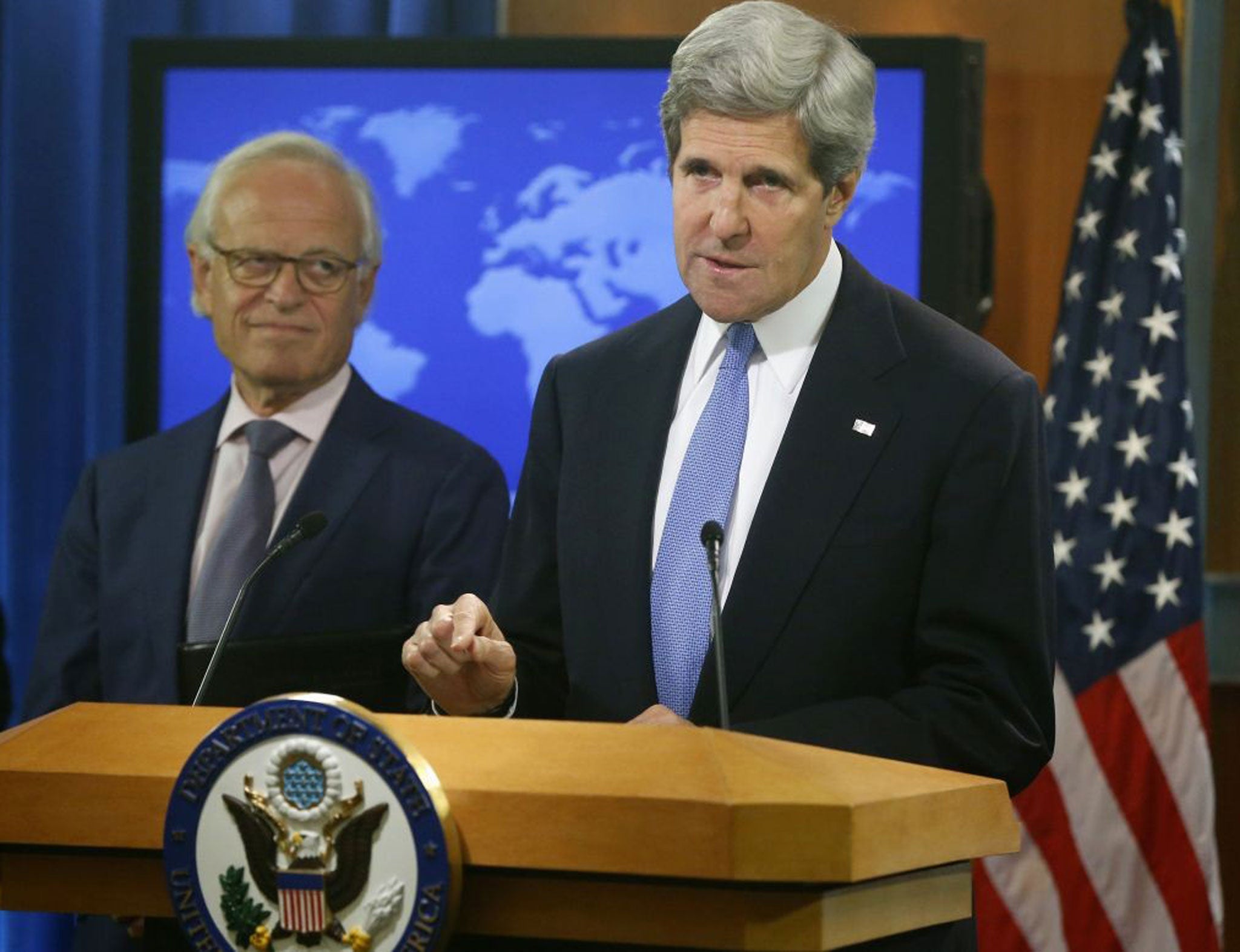Israelis and Palestinians meet in Washington to resume peace talks - but few expect results
Israel's Prime Minister Benjamin Netanyahu faces press criticism over prisoner release plan

As the first direct talks in three years between Israelis and Palestinians began in Washington last night, Secretary of State John Kerry urged Israelis and Palestinians to strike a “reasonable compromise,” and named a new US envoy to oversee this latest effort to produce a solution to the more than six decades-old Middle East conflict.
The peace bid started with a working dinner at Mr Kerry’s home here, attended by high-level delegations led by Israel’s justice minister Tzipi Livni and the veteran Palestinian negotiator Saeb Erekat. The talks, which will deal with procedural issues and continue tomorrow, are aimed at paving the way for negotiations of substance later this year.
The man who will shepherd those negotiations is Martin Indyk, the former US ambassador to Israel, who was closely involved in President Bill Clinton’s attempt to clinch a Palestinian/Israeli deal in 2000. But his task will be daunting. “This is a difficult process. If it were easy, it would have happened a long time ago,” Mr Kerry said last night.
Speaking in New York before departing for Washington, Ms Livni said the talks would be “tough and problematic”.
Those words were merely underscored on Monday by the dark mood among Palestinians on the streets of Jerusalem, the city claimed by both sides as their capital. “There is zero chance of peace,” said Nahar, a middle-aged Palestinian man, articulating the mistrust. “We have been at this process for years and it has led to nothing. All the Israelis want to do is negotiate about negotiating. Why should there be peace now?”
In the West Bank city of Ramallah, home to the governing Palestinian Authority, officials shared those doubts. One anonymous Palestinian official told the newspaper Ma’ariv that the chances of achieving a lasting peace are small. “We would like to believe that there will be a breakthrough, but it is unlikely that the right wing government presently in power in Israel will be able to reach agreements on issues such as the 1967 lines or the right of return. I am not optimistic.”
Chief among Palestinian concerns is the belief that no meaningful negotiations can take place while Israel continues to build settlements in the West Bank – territory that will constitute a future Palestinian state.
Israel has built more than 100 settlements in the West Bank since occupying the territory in 1967. Those settlements, which are illegal under international law, house around 500,000 Jewish settlers and are largely inaccessible to Palestinians. Palestinians say the continued construction of settlements will make any future state unviable, and show that Israel is not serious about peace.
The Israeli government denies that settlements are an obstacle to peace and has called for negotiations without preconditions. Israel has made its security a central tenet in any talks, together with a demand that Palestinians recognise Israel as a Jewish state.
The scepticism in the Occupied Territories over this latest attempt at a peace deal is matched by doubt in Israel too. The Israeli cabinet’s decision on Sunday to agree to the release of 104 Palestinian prisoners – viewed in the West Bank and Gaza as national heroes, and in Israel as terrorists responsible for the maiming and killings of hundreds – led to a maelstrom of criticism for the prime minister, Benjamin Netanyahu.
Despite saying in March that his government would not agree to pre-conditions before any talks, Mr Netanyahu led a campaign over the weekend to get the cabinet to agree to the prisoner release as a means of boosting Palestinian Authority President Mahmoud Abbas in the eyes of his constituents.
“As always, the government has chosen the worst option,” wrote Shalom Yerushalmi in Ma’ariv. He said that rather than face a confrontation with right-wingers in his coalition over a settlement freeze, Mr Netanyahu had instead decided to release the killers of “innocent civilians.”
Similarly, former Defence Minister, Shaul Mofaz told Israeli Army Radio that the prisoner release was not justified: “I think we should release terrorists only when there is no choice. We had a choice. I think the price we are paying is excessive, and sets a very bad precedent for the future. There is no concession from the Palestinian side: they say, ‘there are no preconditions – hey, here’s a precondition.’”
These direct talks, the first since 2010, are but the latest in a long line of failed efforts to resolve the 65-year-old dispute, dating back to the Madrid peace conference in 1991. That gathering led indirectly to the Oslo accords of 1993 and the historic handshake on the White House lawn that September between the former Palestinian leader Yasser Arafat and then Israeli prime minister Yitzhak Rabin, who was assassinated two years later by a Jewish extremist.
In 2000 the two sides came perhaps closest to a comprehensive agreement, during two weeks of intensive but ultimately fruitless talks at Camp David, brokered by Mr Clinton. Since then, various peace bids have been launched, most conspicuously at the Annapolis summit of 2007 convened by President George W. Bush. But all have foundered. The most recent was during President Barack Obama’s first term, but came to grief over Israeli security demands, and Mr Netanyahu’s refusal to halt the settlements programme.
Join our commenting forum
Join thought-provoking conversations, follow other Independent readers and see their replies
Comments
Bookmark popover
Removed from bookmarks